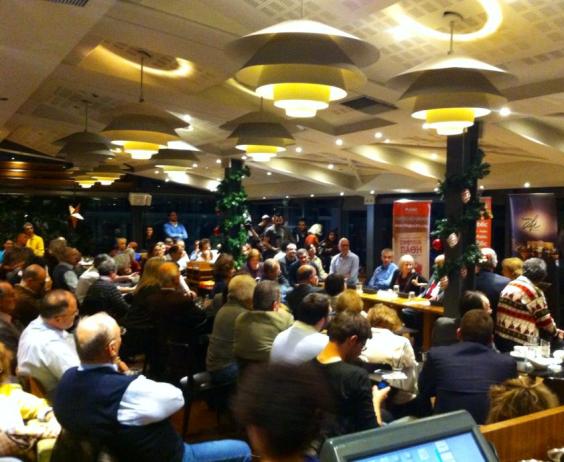Photo: General Secretariat for Press and Information
Anastasia Balezdrova
The Greek Civil War ended in August 1949 with the capitulation of the Democratic Army of Greece - the military unit of the Greek Communist Party. 66 years later the discussion about the reasons for the military conflict and its consequences continue to provoke violent debates among Greek historians and society. And not only among them, because according to some researchers the conflict marked the beginning of the Cold War.
The newest research on the topic entitled "Civil War Passions" by Yale University political scientist Stathis Kalyvas and sociologist Nikos Marantzidis from the University of Macedonia in Thessaloniki was recently presented in Athens.
Indicative of the interest of the audience in the events that happened in the period from the end of the occupation of Greece in 1944 until the end of the Civil War in 1949 is the fact that the hall was full of people during the presentation of the book.

In an interview with GRReporter Nikos Marantzidis talks about the intervention of Bulgaria and other socialist countries in the Greek Civil War, the forced recruitment of fighters and the tactics of sending their children behind the Iron Curtain.
Mr. Marantzidis, what was the role of the People's Republic of Bulgaria in the Greek Civil War?
The intervention of the People's Republic of Bulgaria in the Greek Civil War was particularly significant. It was in the form of various types of support given to the Democratic Army of Greece, i.e. to the Greek communists, partisans, in the period 1946-1949. On one hand, the aid was material. Bulgaria provided all kinds of aid, including weapons, clothing, food and so on. On the other hand, the Greek partisans were trained in military bases on its territory. Bulgaria also provided medical supplies, hospital treatment to partisans, etc. At the end of the Greek Civil War, Bulgaria received on its territory several thousand Greek partisans and others, called Greek political migrants at that time. Some of these people lived in Bulgaria under this status for several dozen years. The majority of them returned to Greece in the 1970s and 1980s, and others after the Cold War.
 How did the geopolitical differences between Stalin and Tito affect the development of the war?
How did the geopolitical differences between Stalin and Tito affect the development of the war?
Due to the conflict between Stalin and Tito, Yugoslavia gradually stopped sending aid to the Greek partisans. At the same time, the flow of aid from the other socialist republics increased, including from Albania, Bulgaria, Romania and especially from Central European countries such as Poland, Hungary, Czechoslovakia. Cominform increased its support precisely to offset the support lost from Yugoslavia. This issue turned into a kind of conflict between Yugoslavia and Cominform over "winning" the Greek partisans.
To summarize, in 1948 the amount of the aid sent by the Cominform member states increased, as a result of the call of the Soviet Union. The only thing that changed was the channel through which it reached the Greek communists. It was delivered not through Yugoslavia but through Albania and, of course, Bulgaria, in the region of Eastern Macedonia and Thrace.
When did the communist countries cease providing aid to the Greek communists?
This happened in various stages. In January 1949, after the battle for Florina that was unsuccessful for the Democratic Army of Greece, Stalin began to realize that the war would not end in favour of the Greek communists. Furthermore, he was aware that it could naturally threaten Albania because of its intervention in the conflict as a territory where the aid to the Greek communists was unloaded. In particular, the aid arrived by ship from the port of Gdansk to the Albanian port of Durres and then it was delivered to the partisans through the Greek-Albanian border. Since Albania had a common border only with Yugoslavia and Greece, immediately after his conflict with Tito Stalin felt the great danger of the country being fragmented, precisely because it already bordered only with two hostile countries. In the early spring of 1949, Stalin decided to conclude this matter. Allegedly, he uttered at that time the famous phrase "withdraw" to Greek communist leader Nikos Zachariadis. Then sending aid to the communists ceased for a while. However, several weeks later, it resumed and stopped completely in August-September 1949 when the last major units of the Democratic Army of Greece left the country. These were the units of the 7th Division, which were in Eastern Macedonia and which remained on Greek territory until November 1949, three months after the Democratic Army of Greece capitulated in August and then withdrew to Bulgaria.
What led to the historical phenomenon known by the term "paidomazoma" and what is its ideological meaning?
"Paidomazoma" is a term that continues to provoke a series of discussions. It is associated with the era of the Ottoman Empire in Greece when this term denoted the taking of children from Christian families in order to be trained and to join the janissaries. As a result, the term has a hard and negative meaning.